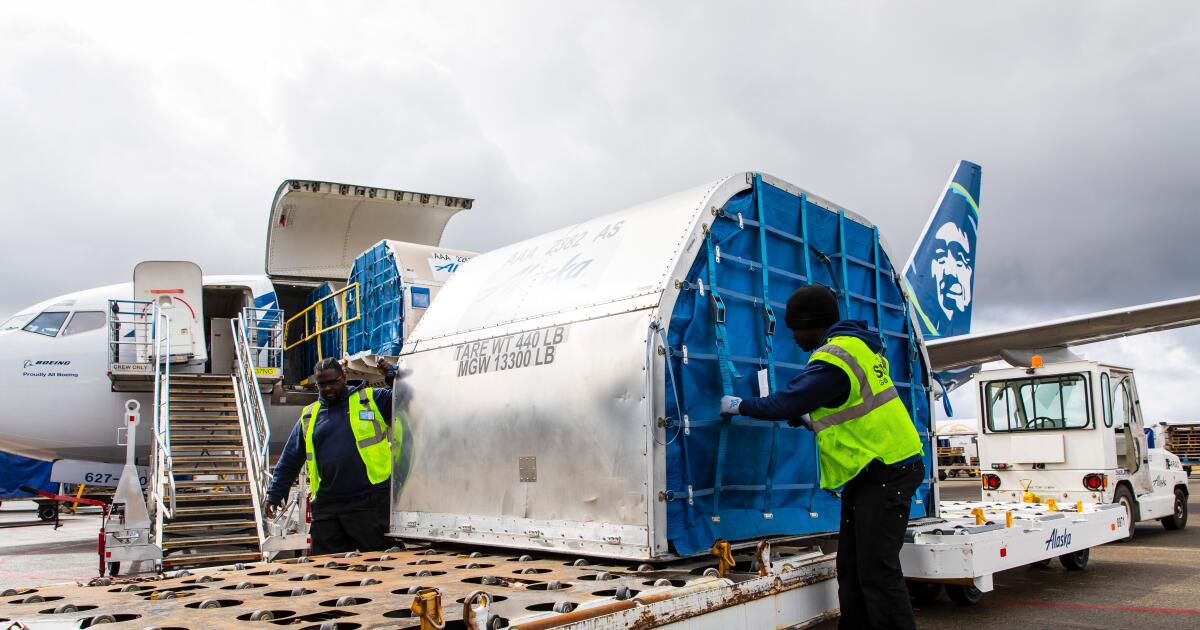
Ever wondered how your online orders travel across the globe so quickly? The answer lies in air cargo, a vital part of the global supply chain. This method of transportation ensures that goods reach their destinations in record time, making it indispensable for businesses and consumers alike. From fresh produce to high-tech gadgets, air cargo handles a diverse range of products. But there's more to it than just speed. Air cargo involves complex logistics, specialized aircraft, and stringent regulations to ensure safety and efficiency. Curious about what makes this industry tick? Here are 15 fascinating facts that will give you a deeper understanding of the world of air cargo.
Key Takeaways:
- Air cargo is crucial for fast and secure delivery of high-value, perishable, and time-sensitive goods across the globe, making it a vital part of global trade and logistics.
- The air cargo industry is constantly evolving with innovations like real-time tracking, automated handling systems, and sustainable practices, ensuring a promising future with efficient and environmentally conscious operations.
The Importance of Air Cargo
Air cargo plays a crucial role in global trade and logistics. It ensures that goods reach their destinations quickly and efficiently. Here are some fascinating facts about air cargo that highlight its significance.
-
Speed and Efficiency: Air cargo is the fastest mode of transport for long-distance shipments. It can deliver goods across continents in a matter of hours, making it ideal for time-sensitive items.
-
High-Value Goods: Many high-value goods, such as electronics, pharmaceuticals, and luxury items, are transported by air. This is because air cargo offers a higher level of security and faster delivery times.
-
Perishable Items: Air cargo is essential for transporting perishable items like fresh produce, flowers, and seafood. The speed of air transport helps maintain the freshness and quality of these goods.
The Scale of Air Cargo Operations
The scale at which air cargo operates is mind-boggling. From the volume of goods transported to the number of flights, the statistics are impressive.
-
Global Reach: Air cargo services connect virtually every corner of the globe. Major airports serve as hubs, facilitating the movement of goods between continents.
-
Massive Volumes: Each year, millions of tons of cargo are transported by air. For instance, in 2021, over 60 million metric tons of air cargo were handled worldwide.
-
Dedicated Cargo Aircraft: There are specialized aircraft designed solely for cargo transport. These planes, like the Boeing 747-8F, can carry over 140 metric tons of goods in a single flight.
Innovations in Air Cargo
Technological advancements have significantly improved air cargo operations. These innovations enhance efficiency, security, and tracking capabilities.
-
Real-Time Tracking: Modern air cargo services offer real-time tracking of shipments. This allows customers to monitor their goods' location and status throughout the journey.
-
Automated Handling Systems: Many airports use automated systems to handle cargo. These systems streamline the loading and unloading processes, reducing the time goods spend on the ground.
-
Temperature-Controlled Containers: For sensitive items like pharmaceuticals, temperature-controlled containers are used. These containers ensure that goods remain within a specific temperature range during transit.
Environmental Impact and Sustainability
Air cargo, like all forms of transportation, has an environmental impact. However, the industry is taking steps to become more sustainable.
-
Fuel Efficiency: Modern cargo aircraft are designed to be more fuel-efficient. This reduces the carbon footprint of air cargo operations.
-
Sustainable Fuels: The industry is exploring the use of sustainable aviation fuels (SAFs). These fuels can significantly reduce greenhouse gas emissions compared to traditional jet fuel.
-
Carbon Offsetting: Some air cargo companies offer carbon offset programs. Customers can offset the emissions from their shipments by investing in environmental projects.
The Future of Air Cargo
The future of air cargo looks promising, with new technologies and trends shaping the industry.
-
Drones for Delivery: Drones are being tested for small cargo deliveries. They offer a quick and efficient solution for last-mile delivery in urban areas.
-
E-commerce Boom: The rise of e-commerce has increased the demand for air cargo services. Online retailers rely on air transport to meet customer expectations for fast delivery.
-
Digitalization: The air cargo industry is embracing digitalization. Electronic documentation, blockchain technology, and AI are being used to streamline operations and improve transparency.
Air Cargo's Impact on Our World
Air cargo plays a huge role in our daily lives. From delivering essential medical supplies to ensuring fresh produce reaches markets worldwide, it’s a vital part of global trade. The speed and efficiency of air freight make it indispensable for time-sensitive shipments. It supports economies by connecting businesses to international markets, creating jobs, and fostering innovation.
Environmental concerns are pushing the industry towards greener solutions, like more fuel-efficient aircraft and sustainable practices. Despite challenges, air cargo continues to evolve, adapting to new technologies and changing demands. Understanding its importance helps us appreciate the complex logistics that keep our world connected.
Next time you receive a package or see a plane overhead, remember the intricate network working tirelessly to deliver goods swiftly and safely. Air cargo truly is a marvel of modern logistics, shaping the way we live and do business.
Frequently Asked Questions
Was this page helpful?
Our commitment to delivering trustworthy and engaging content is at the heart of what we do. Each fact on our site is contributed by real users like you, bringing a wealth of diverse insights and information. To ensure the highest standards of accuracy and reliability, our dedicated editors meticulously review each submission. This process guarantees that the facts we share are not only fascinating but also credible. Trust in our commitment to quality and authenticity as you explore and learn with us.


